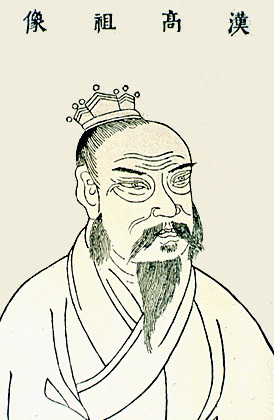Translated by Burton Watson
大風歌 Song of the Great Wind
Emperor Gaozu of Han Quotes
Emperor Gaozu of Han , born Liu Bang , was the founder and first emperor of the Han dynasty, reigning from 202 – 195 BCE. He was one of the few dynasty founders in Chinese history who was born in a peasant family. Before coming to power, Liu Bang initially served as a minor patrol officer for the Qin dynasty in his home town Pei County, within the conquered state of Chu. With the First Emperor's death and the Qin Empire's subsequent political chaos, Liu Bang renounced his government position and became an anti-Qin rebel leader. He won the race against fellow rebel leader Xiang Yu to invade the Qin heartland and forced the surrender of the last Qin ruler in 206 BCE.
After the fall of the Qin, Xiang Yu, as the de facto chief of the rebel forces, divided the former Qin Empire into the Eighteen Kingdoms, and Liu Bang was forced to accept the poor and remote Bashu region with the title "King of Han" . Within the year, Liu Bang broke out with his army and conquered the Three Qins, starting a civil war known as the Chu–Han Contention as various forces battled for supremacy over China.
In 202 BCE, Liu Bang emerged victorious following the Battle of Gaixia, unified most of China under his control, and established the Han dynasty with himself as the founding emperor. During his reign, Liu Bang reduced taxes and corvée, promoted Confucianism, and suppressed revolts by the lords of non-Liu vassal states, among many other actions. He also initiated the policy of heqin to maintain a de jure peace between the Han Empire and the Xiongnu after losing the Battle of Baideng in 200 BCE. He died in 195 BCE and was succeeded by his son, Liu Ying.
